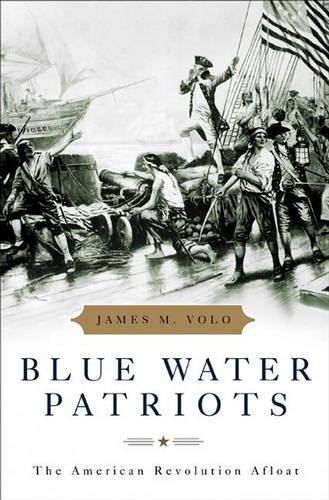
Blue Water Patriots: The American Revolution Afloat
(Hardback)
Publishing Details
Blue Water Patriots: The American Revolution Afloat
By (Author) James M. Volo
Bloomsbury Publishing PLC
Praeger Publishers Inc
30th November 2006
United States
Classifications
General
Non Fiction
Maritime history
History of the Americas
Revolutionary groups and movements
Revolutions, uprisings, rebellions
973.35
Physical Properties
Hardback
312
Description
In 1775, it seemed inconceivable that the American colonists could overcome the overwhelming military superiority of Great Britain. Yet the belligerent colonists were certain they could defeat the British army they so despised. On the other hand, their one great fear was that they would not be able to overcome the presence of the Royal Navy. Somehow though, the colonists were able to resist the British at sea, attract capable allies, and successfully conclude their quest for independence. The primary focus of this work is the period prior to 1779 before the French had come to the aid of the fledgling American nationwhen the Blue Water Patriots confronted the Royal Navy alone, relying on little more than ingenuity and courage. In 1775, it was inconceivable that the American colonists could have overcome the overwhelming military superiority of Great Britain. Yet the belligerent colonists seemed certain that they could defeat the British army they so despised. On the other hand, the one great fear shared by all colonists was that they would not be able to overcome the presence of the Royal Navy. Yet, somehow, the colonists were able to resist the British at sea, attract capable allies to aid them, and successfully conclude their quest for independence. The American Revolution can safely be viewed as part of a prolonged worldwide naval conflict between France and Britain beginning with the Glorious Revolution in 1688 and ending with the British victory at Trafalgar in 1805 during the Napoleonic Wars. This was a period in which the armed merchantmen of the age of trade were replaced by genuine warships whose task was to control the sea lanes. The American Revolution was a watershed in this regard with improved warship designs, new technologies, improved gunpowder and communications, and innovative tactics. Although French participation in the war for independence was crucial, the primary focus of this work is the period before 1779, when the colonists confronted the Royal Navy alone with only their ingenuity and courage to defend them. Every school child knows that the American Revolution began on Lexington Green in April, 1775, but how many are aware that in 1764 a Royal Navy cutter, St. John, engaged in the suppression of smuggling, was fired upon by Rhode Islanders; that in 1769, the revenue sloop Liberty was seized and burned by the people of Newport; or that in 1772, the navy cutter Gaspee was burned in the night by armed patriots attacking from small boats. These Blue Water Patriots fought the first battles on the road to American independence. This is their story.
Reviews
It is the rare book that aims at giving a comprehensive view of any historical event and actually delivers what it promises, but Volo's Blue Water Patriots does just that. In this single volume, readers will find every element that they could ever want of the Revolutionary War at sea. The author summarizes the problems of creating a national navy, discusses the men who served on the ships, and describes the outcomes of their battles. Like most general histories, this book covers the famous ships and captains that most readers are familiar with, such as John Paul Jones, but includes other elements not found in general histories of the Revolutionary War. Volo covers the various state navies, privateers, and coastal raiders that make the war's naval history so interesting. There are also discussions of technical developments, weaponry, and recruiting. The author does an especially good job of tying the causes of the war to the naval and maritime development of the Colonies, thus demonstrating that naval elements of the war were central to the conflict, not just a peripheral concern. Highly recommended. All levels/libraries. * Choice *
Volo's focus is on the period between 1775 and 1779 when most of the combat was between Britain and her rebellious colonies and conducted in the North Atlantic. The strength of his volume is the highly readable style. * The Northern Mariner *
The author describes the naval aspects of the American Revolution, concentrating on the period prior to 1779, when the French entered the war. In addition to describing the most significant engagements between Britain's Royal Navy and opposing colonial forces, the author also offers chapters that provide detail on the characteristics of naval officers, naval administration, types of warships, and armaments. * Reference & Research Book News *
Author Bio
James M. Volo, PhD, has been teaching Physics, Physical Science, and Astronomy for the past 39 years. He received his bachelor's from City College in New York, his masters from American Military University, and his doctorate from Berne University. He has taught on the Graduate level for more than 15 years and authored several reference works regarding U.S. military, social, and cultural history. In addition, he has consulted on TV and movie productions. Among his published works are Blue Water Patriots: The American Revolution Afloat (Greenwood, 2006), Daily Life in Civil War America (Greenwood, 1998), Family Life in the 19th Century (Greenwood, 2007), the Popular Culture of the Antebellum Period (Greenwood, 2004), and the Encyclopedia of the Antebellum South (Greenwood, 2000). Several of which were co-authored with his wife Dorothy Denneen Volo. Presently, Dr. Volo teaches at Sacred Heart University in Fairfield, Connecticut.
